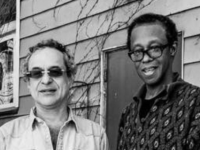There aren’t any settings too challenging or unusual for saxophonist Ivo Perelman. His torrent of recorded production comes about largely because he eagerly seeks these challenges and immediately corrals new partners or combinations of partners into a studio where they tell the engineer to roll the tape and proceed to play whatever comes to them in the moment.
One of Perelman’s latest collaborations is with a guitarist which on the surface, doesn’t seem like a new challenge. After all, you can find several occasions where Perelman got together with improvising guitar ace Joe Morris. But Perelman was attracted to playing with Pascal Marzan precisely because he’s not like Morris or too many other guitarists, for that matter.
The French plectrist Marzan starts with classical training for a foundation from which his improvised music springs forth. He’s worked with several of UK’s noted improvisers like Alex Ward, Keith Rowe, John Russell, Steve Beresford and the London Improvisers Orchestra. It’s there in London where Marzan and Perelman crossed paths and they clicked right off. Perelman has several areas of commonality with the Frenchman; Perelman had once played guitar himself, he was even a classical guitar prodigy. And though Perelman switched instruments, he likewise drifted toward full-on improvisation, where he has thrived the most.
Since clicking with Perelman equates to recording with Perelman, we now have Dust of Light/Ears Drawing Sounds. Marzan came to this session with a guitar, but the guitar he came with is key to how this record turned out. It’s a 10 string classical guitar tuned to one third intervals, enabling him to play both microtones and the ‘normal,’ even temperament notes. That both brings Marzan into Perelman’s realm and at the same time, pushes Perelman himself further into it.
Partly because of the guitar played and partly because of Marzan’s unique background, his guitar heard on the opening “Hot Dust-Obscured Galaxies” won’t draw comparisons to anyone else; it is truly unique. It’s not just in his note choice (he’s clearly got more of them to choose from) but in his fingering of those notes. Still, Perelman is assured in his approach to mingling with this eccentric instrument, fully understanding his tenor sax can match or harmonize with any note produced by it, and he also has the uncommon ability to do so nearly instantaneously.
Each track reveals more of Marzan’s exotically esoteric guitar; on “Mysterious Bells” it shares some timbres of an African kalimba or a Japanese koto, giving it a distinctly world folk music sound. Marzan’s guitar mimics a swarm of bees while bending notes similar to Hawaiian style guitar on “High Mountain Walk.” Marzan chimes his strings on “Calling At The Doorway” in response to Perelman’s carousing in the high register.
As with all Perelman tête-à-tête’s, the connection and communication is supernatural. “Bees And Squirrels In The Garden/Two Bees At My Window“ goes off in a frenetic and free pace. Marzan’s attacking those harpsichord-sounding strings like Derek Bailey is sort of alien until you realize it’s the very thing that puts him in closer communion with Perelman, even as they get downright playful in spots.
Perelman summons the spirits of old tenor masters like Ben Webster filtered through his unique voice on “Sun Through Closed Eyelids” and Marzan responds with his own brand of fragility. The common influence of the Brazilian composer Heitor Villa-Lobos shows up on “River Mirroring A Smiling Moon,” through dissonant lens. “Conversation In The Wind/Conversation With The Wind” has the enunciation of human speech.
A meeting of artists who do not impose any rules on themselves is bound to produce music that dares to be dazzling in ways not previously heard, and that’s just what Dust of Light/Ears Drawing Sounds delivers. Pick up Dust of Light/Ears Drawing Sounds, now available, from Bandcamp.
- Ches Smith Quartet – ‘Clone Row’ (2025) - May 30, 2025
- James Brandon Lewis Quartet – ‘Abstraction Is Deliverance’ (2025) - May 27, 2025
- Soft Machine – ‘Drop’ (1971, 2025 remaster) - May 21, 2025




